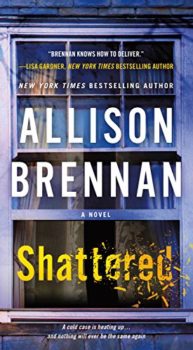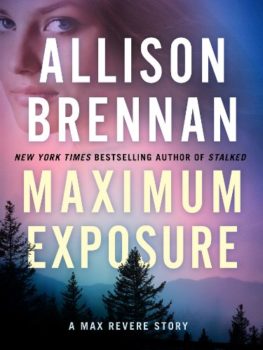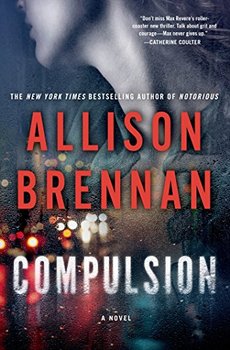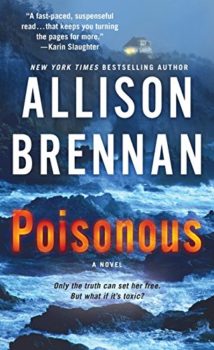
Max Revere Book #4
May 1, 2018
St. Martin's Paperbacks
ISBN-10: 1250129273
ISBN-13: 9781250129277
Available in: Hardcover, Paperback, Audio, e-Book (reprint)
* This site contains affiliate links to products. We may receive a commission for purchases made through these links. Specifically, this site is a participant in the Amazon Services LLC Associates Program, an affiliate advertising program designed to provide a means for website owners to earn advertising fees by advertising and linking to amazon.com, audible.com, and any other website that may be affiliated with Amazon Service LLC Associates Program.
Shattered
Allison Brennan’s New York Times bestselling Lucy Kincaid and Max Revere series collide in a powerful tale of revenge, betrayal, and the desire for justice.
Over a span of twenty years, four boys have been kidnapped from their bedrooms, suffocated, and buried in a shallow grave. Serial killer or coincidence? That’s the question investigative reporter Maxine Revere sets out to answer when an old friend begs her to help exonerate his wife, who has been charged with their son’s recent murder. Max turns her attention to three similar cold cases. If she can solve them, she might be able to help her friend.
Haunted by her nephew Justin’s death for years, FBI Agent Lucy Kincaid yearns to give her family—and herself—the closure they need. When Max shares her theory on all three cases—that Justin may have been the first victim of a serial killer—Lucy is convinced that between Max’s research and her experience they can catch a killer and justice will finally be served. But the very private Lucy doesn’t trust the reporter any more than Max trusts a cop. Max and Lucy must find a way to work together to untangle lies, misinformation, and evidence to develop a profile of the killer. Together, they make a shocking discovery: Justin—s killer is still out there…stalking another victim…and they already may be too late.
Originally published August 2017 in hardcover and eBook by Minotaur Books.
Chapter One
Wednesday
Maxine Revere, investigative reporter, learned the hard way that insinuating herself into the middle of an active police investigation was a recipe for disaster, which is why she focused primarily on missing persons and cold cases. Law enforcement was usually willing to talk when the case was dead in the water. Unsolved cases grated on the nerves of most cops. If Max used her extensive financial resources and media access to gather actionable information, cops would often work with her.
Worse than shaking things up in the middle of an investigation was showing up right before a trial. The bad guy was behind bars, the powers that be were a 1,000 percent positive they had the right person, and Max’s involvement caused the chief of police, district attorney and prosecutor to lose sleep. She didn’t much care—if they were confident with their evidence, there was nothing to lose sleep over.
But Max rarely did anything the easy way, so when her old college friend—okay, old college ex-boyfriend—called her weeks before his wife was to go on trial for the murder of their only child, desperately believing that she was innocent, Max agreed to fly to Scottsdale, Arizona to listen to John’s theory which—she had to admit—sounded intriguing over the phone.
Still, in Max’s experience, while occasionally the wrong person was accused and imprisoned, the prosecution rarely went forward with a costly trial when they didn’t have ample evidence for a conviction. Not only because of the cost, but politics. A high profile case such as a wealthy mother killing her eight-year-old son? Everyone was under a microscope from the beginning. With such scrutiny, the DA wouldn’t let it go this far without something solid to sway a jury. So even though it was John Caldwell—a man Max respected and even admired—asking for her help, she needed more than his faith in his wife’s innocence.
It was the cold cases that had her flying from New York to Phoenix. Three cold cases in the southwest that were eerily similar to the murder of Peter Caldwell.
#
Max had interviewed many defendants and witnesses during her decade-long career as an investigative journalist. Most of the lawyers she dealt with either wanted nothing to do with her or attempted to manipulate her into printing only information favorable to their client.
She didn’t know what to expect from Charles North, the respected criminal defense lawyer who represented Blair Caldwell. But a condition of her interview with Blair was that she would first meet with North, where he would “lay down the rules.”
Max always enjoyed these conversations.
Boxer, North and Associates had the top floor of a high rise in downtown Phoenix, boasting views of Chase Stadium. As Max waited for North in the lobby—decorated in subdued desert hues—she wondered why Blair asked that the interview be conducted in her attorney’s office. Blair had expressly said she hadn’t wanted Max to come to her house. Originally, she was going to meet with them yesterday after she arrived, but instead John came alone to the Biltmore, where Max was staying, and gave her what she considered a lame excuse for Blair’s absence. They’d talked for several hours, and the anguish in John’s voice was clear.
His son’s death had gutted him and John was desperate to protect his wife. She was innocent, the result of a legal system gone awry, according to John.
“Blair couldn’t kill anyone, let alone our son. But the police couldn’t find a suspect, they twisted everything around, and arrested Blair. They have no evidence. None.”
Max had reminded John multiple times—because he didn’t seem to absorb her meaning—that she would give him the truth, but that maybe a private investigator would be more appropriate than an investigative reporter.
“Blair’s attorney has a private investigator on staff,” John had said. “They don’t care who killed Peter. They only want to prove it wasn’t Blair.”
John was correct, but Max had explained—twice—that she didn’t work active homicide investigations. Cold cases were different because—usually—the crime was more than a year old and the police didn’t have a suspect. The only time she stepped into a hot case was a missing person because a media spotlight could often be helpful.
John was convinced that if Max solved the three cold cases that were similar to Peter’s murder, that she would de facto solve Peter’s murder. Max thought he was stretching. Yet here she was, waiting to talk to Blair and her attorney. John was one of Max’s few close friends. How could she say no? How could she turn her back on a friend when she didn’t have many to spare?
Besides, the three cold cases were more than a little intriguing. Peter Caldwell aside, if her staff had presented her with the cases as a possible investigation for her monthly crime show “Maximum Exposure,” she would have seriously considered it.
Her phone rang and she almost sent it to voice mail, but it was a call she’d been expecting. She stepped away from the receptionist and answered.
“Counselor,” she said, her voice warm and smooth, “I’ve been expecting your call.”
“You threatened me, and I’ve had enough.”
She went from cordial to heated in a heartbeat. “I didn’t threaten you, Mr. Stanton. I gave you a courtesy call.”
“Courtesy? That’s what you call exploiting my son’s murder?”
She went from heated to angry in the next heartbeat.
“I said I didn’t need your permission, but I want your help.” Her voice was even but sharp. “You’re the one who has been avoiding my calls.”
“Let me explain something to you, Ms. Revere,” Stanton said. “Without me, you have nothing. No one will speak to you. You step out of line, you will be arrested. My son is off-limits. Are we clear?”
“Your son’s murder is unsolved, and I believe I can solve it.” Why did she say that? She’d never solved a murder nearly twenty years cold. It was next to impossible.
But she was angry, so she didn’t backtrack—not that she would have. Showing doubts, showing weakness, wouldn’t get her what she needed.
“Do you think I haven’t used every legal resource at my disposal to solve Justin’s murder? He was my son, I’m the district attorney, and I have never forgotten.”
Max dialed back her anger. Just a bit. “My track record speaks for itself, Mr. Stanton. I have connected Justin’s murder with two and possibly three similar crimes, but I need more information. Meet with me. Please,” she added. “I’ll explain my theory and share everything I have learned.” Which was very little at this point. “If after we meet you are still adamant about not helping, I’ll respect that.”
“And back down?”
“Of course not,” she said. Obviously the San Diego District Attorney didn’t know her reputation. “I’ll still investigate. I simply won’t include you. I’ll fly to Idaho and speak with your ex-wife.”
“Leave Nelia out of this.” She could hear the venom in his voice. Score one for her—she knew how to ensure his cooperation.
“Justin was her son, too.”
“Blackmail now?”
“Really, that’s what you’re going with? Blackmail.” Max was trying to give Andrew Stanton some leeway because he had lost his son, but the lawyer was making it difficult for her to play nice.
“Nelia has been through hell, I won’t allow you—”
“Stop,” Max said. She spotted who she presumed for North’s assistant standing by the reception desk looking at her. “You have my producer’s phone number. Call him. He’ll answer your questions and you can feel free to browbeat and threaten him over the phone. Ben lives for conflict. But I will be in San Diego tomorrow afternoon. Either you work with me or you don’t, but you’re not going to stop me.”
She ended the call and took a long, deep breath. She needed to regain her composure if she was going to be on her A game with Blair Caldwell.
Max was digging a deep hole for herself. The four cases—Peter Caldwell’s murder and the three others—had many similarities, but similarities didn’t solve crimes. She’d been pulling together research for the last two weeks, and she still had very little to go on. The police had connected none of the four cases, and proving they were linked would be impossible if she couldn’t access police records and forensics reports. The first two homicides were unsolved; in the third the father was in prison; and the last—Peter—was built on circumstantial evidence.
She and her staff were working several threads, but so far nothing she pulled led anywhere. Max could neither prove—nor disprove—a connection. She needed to be in the field, talking to people who had been there, reading the files, analyzing the data, re-interviewing witnesses and suspects. And even then, she had never tackled an assignment of this magnitude.
Yet, you tell Stanton that you can solve his son’s murder.
She had put her reputation on the line with one angry comment. That deep hole she saw herself standing next to had just gotten a whole lot wider.
“Ms Revere?” The young man who had been standing at the reception desk walked over to her. “I’m Ron Lee. Mr. North is ready for you.”
“Thank you,” she said formally and pulled herself together. She didn’t know why this investigation had gotten under her skin. She prided herself on maintaining a level of detachment from the victims, the surviving family, and law enforcement. But lately, she’d found herself more wrapped up in the lives of the people involved in an investigation than she was comfortable with. She couldn’t seem to find the personal detachment that had served her well for so long.
Max followed Ron down the wide hallway, which turned before reaching double doors with Charles North engraved on a gold plaque. The assistant knocked on the door, waited for permission to enter, then grandly opened both doors.
“Ms. Maxine Revere,” Ron announced formally.
North rose from his desk and crossed the large corner office. Blair wasn’t in the room.
He took her hand. “Ms. Revere, I’m Charles North. We spoke on the phone.” He turned to his assistant. “Ron, please sit with Mrs. Caldwell until I need her.”
“Yes, sir.” Ron closed the doors on his way out.
North motioned for Max to sit at a conference table that could comfortably sit twelve. He sat at the head. Common tactic. Max smiled and took a seat two down from him. “Thank you for precipitating this meeting.”
“As I told you last week,” North said, “I disapprove of Mr. Caldwell’s investigation and his ill-conceived theory. He is a man grasping at straws who doesn’t understand the legal system and the primary goal of my team. Our goal is for the jury to return a not guilty verdict. We believe that the State will not be able to prove their case against my client.”
As with many lawyers who Max had met over the years, North spoke clearly and formally.
“You indicated during our earlier conversation that the prosecution lacked evidence, but you were not specific.”
“I will not outline our legal strategy to the media prior to trial. As I also said over the phone, I would consent to an interview after the trial is concluded. It is my understanding that you will be covering the trial for NET?”
It was worded as a question, because Max hadn’t actually said anything about media involvement in Blair’s trial.”
“NET will be covering the trial.”
“But not you?”
“Either myself or Ace Burley, NET’s crime reporter.” She didn’t want to cover the trial, but she was already out here. She might be stuck with it. NET gave her a lot of leeway to run her show and her investigations as she wanted—a condition of her agreeing to host “Maximum Exposure” in the first place. So when they asked for something—like covering a trial—she generally agreed. It was her least favorite aspect of her job.
“Then what is your interest in this case? Other than the fact that you’re John Caldwell’s ex-girlfriend.”
Had John or Blair told the lawyer about her relationship with John? She hadn’t expected the information to be kept secret, but she certainly hadn’t intended to lead with the fact that she’d dated John for a year while they were both at Columbia University.
Max leaned back in the leather chair. “Mr. North, Blair already agreed to talk to me. Please bring her in.”
“I advised Mrs. Caldwell not to speak with you. She overruled me, but be aware that she is only doing this for her husband. I ask that you consider that before using anything she says.”
Max already suspected that Blair agreed to talk to her because John wanted it. She said, “Over the past decade, I have covered dozens of trials, investigated hundreds of cold cases, and interviewed thousands of witnesses, victims, suspects, and family members.”
“Your point, Ms. Revere?”
“You have a job, I have a job. Let me do my job. Because whether or not Blair Caldwell speaks to me is irrelevant. I’m not packing up and going home.”
Charles sighed. “I doubted you would, though I had hoped.”
“Does the truth scare you?”
“The truth is subjective.”
Max laughed, but she wasn’t amused. “Truth is objective. It’s neither good nor bad. It’s what we do with the truth that is subjective, because we are flawed.”
The defense lawyer sat there for a moment. “I think you and the Caldwell’s are making a huge mistake.”
“I’m not making a mistake,” Max said. “I can’t speak for John or Blair.” She leaned forward, kept her voice calm and friendly. She may not be able to sway the lawyer, but she didn’t want him to actively oppose her efforts. “Charles, I have one question for you—and I promise that I will not quote you, I will not even mention the situation except for what has already been reported in the press.”
“I can’t promise to answer, but you may ask.”
“The local news reported a leak out of the DA’s office that they’d offered Blair a plea deal and she declined. I’m not asking for the details,” she added quickly, knowing what his primary objection would be, “but did you recommend to your client to accept or decline?”
He stared at her for a long moment. He would make an outstanding poker player—maybe that’s why he was so good as a trial lawyer.
“Wait here.”
He walked out of the interview room without answering her question.
She liked him.
Charles North was a top criminal defense attorney, and his firm wasn’t cheap. He’d made his name after defending a professional athlete who was charged with killing his mistress. The jury had been hung, and the prosecution retried the case, and then lost—a not guilty verdict. North had made a small fortune on the two trials, but the ballplayer had walked free. Max didn’t know if he was guilty or innocent. She’d never looked into the case. But North had been praised by his colleagues, including the prosecution, for his professionalism.
She’d always wondered what motivated lawyers to specialize in criminal defense. Some, perhaps, because of the money. A big defense trial could be extremely lucrative. She’d known enough lawyers in her life to know that most didn’t take cases out of some noble cause of righting wrongs, believing that their clients were always innocent and they were champions of a corrupt court system. Most treated their clients as a job. They did due diligence, ensured legal rules were followed, and worked out plea deals to the benefit of their clients. The most noble—for lack of a better word—defense lawyers believed in the system just as much as the prosecution. They went into practice because they believed in their heart and soul that every person, rich or poor, black or white, deserved a fair trial. That the goal wasn’t to win or lose per se, but to ensure that the police behaved, that the prosecution played aboveboard, that the accused was treated appropriately. And yes, that the evidence was fair and untainted.
North’s goal was clearly to get a not guilty verdict, which didn’t mean he thought his client was innocent. That only meant he thought the prosecution had no case.
There was no way in hell the DA or the cops would meet with Max. She’d gone through the motions—if necessary, she could say so-and-so declined to comment. But she wasn’t expecting a quote or cooperation. The only way Max could learn about the case was through the defense and it was clear North wouldn’t give her anything—except allowing her to talk to his client against his advise.
She was going to have to get everything she could out of Blair Caldwell.
Sometimes what someone said—or didn’t say—wasn’t as important as how they behaved.






